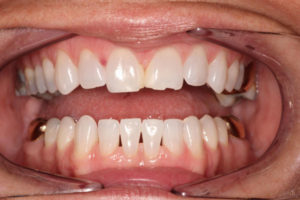Phone: 910-762-3481
Young or old, anyone with teeth could potentially develop cavities. Here’s a look at factors that can increase the risk of getting cavities: 
● Certain drinks and foods. Food sources that cling to the teeth for an extended time — like ice cream, milk, sugar, honey, dried fruit, soda, cookies, cake, candy, chips and cereal — are more than likely to lead to decay than food sources that easily are washed away by saliva.
● Inadequate tooth brushing. If you do not clean the teeth soon after drinking and eating, plaque quickly forms and the first phases of decay may start.
● Dry mouth. This condition is caused by a lack of saliva, which assists in preventing tooth decay by washing away plaque and food from the teeth. Also, substances that are found in saliva assist in countering the acid generated by bacteria. Some medical conditions, specific medicine, radiation to the neck or head, or specific chemotherapy medication may increase the opportunity of cavities by decreasing the production of saliva.
● Location of a tooth. Decay most frequently happens in the back teeth. Those teeth have a lot of nooks and crannies, as well as several roots that may trap food particles. In turn, they are more difficult to clean than your easy-to-reach front teeth.
● Bedtime baby feeding. When infants are offered bottles at bedtime filled with apple juice, formula, milk, or additional fluids that contain sugar, those drinks stay on their teeth for a long period of time as they rest, feeding bacteria that causes decay. Oftentimes, the damage is referred to as baby bottle decay. Likewise damage may happen once toddlers walk around sipping from their sippy cups filled with sugary beverages.
● Not getting sufficient fluoride. A naturally occurring mineral, fluoride, assists in preventing cavities and even can reverse the earliest phases of tooth damage. Because of fluoride’s benefits for teeth, it’s added to a lot of public water supplies. It also is a typical ingredient in mouth rinses and toothpaste. However, bottled water generally doesn’t contain fluoride.
At Phelps Family Dentistry, it’s possible to rest assured that the health of your mouth is our top priority. Beginning with your comprehensive examination, Dr. Lisa and Dr. Dan will offer you a roadmap for maintaining and achieving exceptional oral health. Call us today at (910) 762-3481.